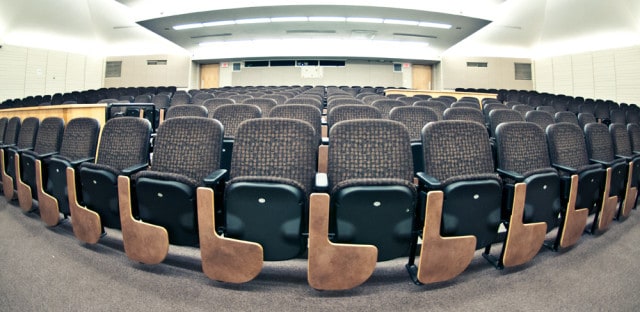
The barren seats of the Neatby-Timlin Theatre in the Arts Building, where University Council holds their monthly meetings, are expected to fill up with guests by 2:30 p.m. Jan. 24, as council is scheduled to vote on TransformUS.
A crush of students are set to pack University of Saskatchewan council chambers Jan. 24 as top administrators look to lock down approval for TransformUS, the massive program review that aims to permanently axe $25 million in spending.
Those savings will come from cut salaries and restructured or eliminated programs.
Student leaders say they want representation on the task forces that will examine and prioritize dozens of academic and administrative programs.
A Facebook event page set up by U of S Students’ Union executives and councilors calls on students to attend the council meeting and “voice their opinions about the composition of the task forces.” At the time of print, 140 guests are slated to attend and urge council to strike down the current plan.
University Council is made up of two elected faculty members from each college (one of whom is usually the dean), one student from each college, two librarians and 54 faculty members-at-large.
“Recognizing that cuts will have to be made, this will be a chance to express our discontent on the lack of student representation on these task forces,” the description of the event page reads.
“We, as students, are very large stakeholders in the success of the University of Saskatchewan and are able to provide a unique perspective that could otherwise be missed by the proposed composition.”
If TransformUS is given the go-ahead by council, two separate task forces will be formed — one to rank academic departments and colleges and another to rank administrative divisions, like communications, facilities management and human resources. Once programs are prioritized, those that rank lower will be downsized or cut completely, while those that rank higher could see an increase in funding.
A common criterion for program prioritization at other universities has been profitability, along with factors such as aboriginal engagement and research outputs.
According to a campus-wide email from President Ilene Busch-Vishniac, the task forces will consist of high-ranking faculty members and administrative managers. No students will be directly involved.
“Students will not be included as members of the task forces because of the amount of work entailed and the significant impact this activity would have on their studies, both task forces will be charged with devising appropriate and effective mechanisms for student input and participation in the prioritization process,” Busch-Vishniac wrote.
But Jared Brown, president of the U of S students’ union, says students need a direct line into decisions that impinge on their education.
“We don’t know what’s coming. We are left in the dark…. It would be nice to know what is going on,” he said in an interview with the StarPhoenix. “Yes it’s not going to be easy, it’s not something that we are going to take lightly, but we know that our perspectives can help.”
Provost and Vice-President Academic Brett Fairbairn, however, argues that students will be fully consulted despite not having a place on the task forces.
“The task forces will solicit input, operate transparently and share their analysis, but without interest-based representation,” Fairbairn said in a written statement to the StarPhoenix. “Students can certainly be involved by providing input to the task force.”
The Canadian Federation of Students, one of the largest student groups in Canada, has requested that the university extend the TransformUS timeline by at least one year to ensure students are properly represented and engaged in the review process.
“The recently-announced austerity program at the University of Saskatchewan intentionally leaves students on the sidelines,” CFS Saskatchewan representative Kent Peterson said in a news release.
“The task forces being proposed do not allow enough time for student consultation, especially since four months are lost due to the summer months. Extending the TransformUS deadline and adding student representation to the task forces will not only add much needed legitimacy to the process, but it will signal that President Busch-Vishniac takes this process seriously.”
In a letter published in the StarPhoenix Jan. 15, Peterson, a former president of the University of Regina Students’ Union wrote, “The U of S now joins the University of Regina in systematically dismantling the academic structures of the two universities.”
Peterson called TranformUS “undemocratic” and said “ultimately, it will be the students who — through higher tuition fees, increased debt and limited academic options — will shoulder the burden of cost-cutting and offloading.” He concluded by urging the U of S to “learn from the mistakes of the U of R and include student representation and consultation in every aspect of the two task forces.”
Four days later, on Jan. 19, U of R Provost and Vice-President Academic Thomas Chase shot back with his own letter published in the StarPhoenix.
“As a former president of the students’ union and former member of the university’s board of governors, Peterson well knows that U of R students have been, and continue to be, involved through voice and vote at multiple stages of program reviews,” Chase wrote.
Chase pointed to Regina students’ ongoing involvement in a handful of committees and advisory groups that direct much of the cost-cutting plans. He called Peterson’s claims “misleading rhetoric” and “nonsense.”
“To suggest that students [at the U of R] are excluded from institutional review processes is, at best, disingenuous,” he said.
[box type=”info”]Correction 01/24/13: in the print edition of this story, we incorrectly reported that the meeting on Jan. 24 will begin at 6 p.m.. The meeting, in fact, begins at 2:30 p.m.[/box]—
Photo: Raisa Pezderic/The Sheaf
Leave a Reply